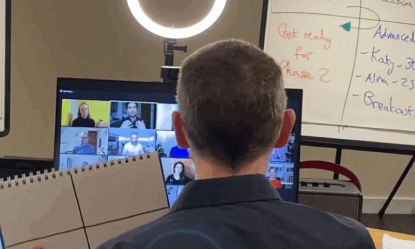From students embarking on their first role in business, all the way up to C-Level executives, most people will be haunted by Imposter Syndrome. It’s that nagging doubt that “You’re not good enough”, “You’re going to get found out” or that “Someone might catch you with a question you can’t answer”. Science writer Sandeep Ravindran estimates that nearly 70% of people will experience Impostor Phenomenon at least once in their life.
So what? Surely if most of us have it and live with it, then it’s not such a problem? The impact, however, of Impostor Syndrome is costly. In fact, a recent BBC article links impostor syndrome to emotional exhaustion and burnout.
In that same article, Clara Josa, author of ‘Ditching Imposter Syndrome’ identifies the four ‘P’s connected with impostor syndrome: Paralysis, Procrastination, Perfectionism and People-Pleasing. Ultimately, these negative outcomes can affect our productivity, performance and our mental health.
I’d like to share a piece of advice that I often use to reassure my clients on overcoming impostor syndrome, as it’s something I suffer from too. It may sound a little severe, but I believe it helps to be reminded. When you are the one speaking in a meeting, a presentation, on a call, or even writing an email it’s really not about you! There… I said it!
I don’t mean to diminish your knowledge, skills and ability. It’s simply that when you’re sharing information, it’s so easy to put the burden of expectation on yourself; that you must get it right and you can’t mess up or forget anything. The truth though is that you, me, all of us in our business communication are simply the conduit. We are a pipeline for knowledge and the success of our communication lies in our ability to get that knowledge out of our brain and into the brains of others in the clearest and most memorable way.
When Interstellar’s Michael Caine discovered the importance of listening
Many people might think that to be a good actor you simply need to memorise your lines and regurgitate them on command. You may have heard the adage that “Acting is about reacting”. Before he became a huge Hollywood star, Michael Caine learned the importance of this while rehearsing for a play.
Caine was asked by a theatre producer why he was sat doing nothing on-stage while another actor was speaking. Caine replied that he wasn’t doing anything because he had no lines to speak. The producer suggested that, instead of doing nothing, he sit there and listen. Caine summarises, “… the greatest piece of advice I could give to someone… is to LISTEN AND REACT.”
The greatest piece of advice I could give to someone is to listen and react.
Michael Caine
An actor standing on stage waiting for their turn to speak will not be listening. If their focus is on themselves, it can lead to self-awareness which leads to inauthentic acting. That actor’s physical and vocal choices will be stilted and unnatural.
It is the same in business meetings and presentations. When we focus on ourselves, we stop listening, we become self-aware and we act inauthentically. If you’ve ever been in a meeting where people speak to you with monotonous voices while forgetting to gesture or put any emotion on their face, you’ll understand what it means to be inauthentic. People are very good at spotting inauthenticity in others and it can be incredibly off-putting and damaging when our colleagues, clients and customers realise that we’re not being ourselves and we’re not oriented to what they want and need.
How to overcome impostor syndrome in business meetings
So, what can you do to take the pressure off yourself in your business meetings? Much has been written by my colleagues around mindset and overcoming mental blocks and I would recommend all those techniques in conjunction with what I am about to suggest.
I want to share a different approach that stems from my career as a professional actor. In the three years I spent training at drama school and the 18 years of working on stage and screen, I have gathered and honed techniques to be more instinctive, organic and credible in my job. I have failed many more times than I have succeeded but here are two techniques you can use to approach your business communication. My wish is that they help you to feel more comfortable and natural in meetings and to build trust with those you’re speaking to.
1. Focus on Words, Tone and Body Language
Focusing on words, tone and body language is a key part of overcoming impostor syndrome. It sounds simple but it takes practice. Twenty one years of practice in my case. In your meetings, whether you’re talking or listening, put your focus on the people around you. Ask yourself at every moment: “What do they need from me and how is that information landing on them?” Read their body language and listen to the words they use and the tone of voice in which they speak them. They will tell you everything and, often, what they don’t tell you will say more. When we listen deeply to other people it builds trust. It says, “You’re important to me”.
There is a form of acting training called The Meisner Technique. In classes, actors begin early in the course, in silence, sitting opposite each other, to simply notice the other’s behaviour. Later, they move on to describing that behaviour out loud and repeating it back to each other until the behaviour changes. At that point, they move on to describing and repeating the new behaviour. And so, it goes on. In this way, they are focussing wholly on the other person, working moment to moment with what is happening in front of them.
Like the principles of Meisner, work in your meetings and virtual calls to focus your attention, like a laser beam, on those around you and work moment to moment with what they need.
How to overcome distraction in virtual meetings
There is so much to break our focus in the virtual realm. The main challenge is that having your own face constantly reflected at you is proven to be both stressful and exhausting, as written about in a National Institute of Health paper by René Reidl, ‘On the Stress Potential of Videoconferencing: Definition and Root Causes of Zoom Fatigue’. My advice, and indeed preference, is to hide your own live feed. It’s usually an option marked ‘Hide View’ or ‘Hide Self-image’. Rather than have your eyes constantly darting to your own, onscreen face, you can now focus all your attention on those you are speaking to.
Top tips to improve your focus
If you want to build the duration and quality of focus, practice in everyday environments. The next time you are on public transport or in a café or bar, watch the people around you. I don’t mean in a creepy way! Simply home in on their behaviours, on their tics and on their non-verbal leakage (non-verbal behaviour that contrasts with what someone is verbalising). Try to build a picture of what they might be thinking and feeling. The more you practice this, the easier it will be in meetings.
2. Set a Clear Intention
Once you have placed your focus on those in the meeting, you need to attach an intention to that focus. What are you trying to do? How are you trying to affect those people? Without intention, your business message is like your favourite dish, if it was lacking all seasoning… bland.
A practical way to set an intention is to connect emotions to different parts of your message. Be clear on how you want people to feel in any given moment and then work moment to moment to radiate that through your words, tone of voice and body language.
Too many dull, lifeless business presentations miss the mark because the ‘speaker’ has never considered this. If they were to be asked “How do you want me to feel about that graph/those figures?” most people might answer “I’ve no idea. I’m just presenting the data my boss asked me for.” Those attending this type of meeting will switch off easily and leave uninspired and unaffected. It’s boring.
Every one of you reading this article is a thinking being, yes… but you are also a feeling being. The emotional part of all our brains is far more influential than the logical part. We will all have instinctive, gut reactions to people, products, ideas and companies and we will then seek logical reasons to justify those emotions. Wouldn’t it be better then to have people leaving your meeting feeling a deliberate emotion. You may wish to ‘reassure’ a client, ‘inspire’ a colleague or even ‘unsettle’ your boss (if the intention is to draw attention to unaddressed concerns). People in those meetings will be able to follow a message more clearly, will stay engaged for longer and will take away a far greater understanding of the actions and next steps to be taken.
Marlon Brando and Robert De Niro Do It Too
There are many well-respected directors who spend weeks of a rehearsal process working through a script and getting their actors to ‘action’ their lines. What this means is actors will choose a verb, a ‘doing’ word to attach to every line they speak. This way, when they begin rehearsing and performing, there is intention behind every line and the actors and audience will be affected by every word of the performance. It’s a technique used by some of the greatest actors of our time: James Dean, Dustin Hoffman, Marilyn Monroe, Robert De Niro, Al Pacino, Daniel Day Lewis and Marlon Brando, to name but a few.
How to Choose Your Intention
As an actor would do performing for a live or recorded show, I recommend the same thing to my clients: preparation, preparation, preparation.
Before any business message or communication, write a script or make some notes. As you do, choose the emotion that you want to convey with each part of your message. Depending on who you ask, it’s said that there are between 3,000 and 35,000 words to describe emotions in the English language. If you Google ‘Wheel of Emotions’ it will take you to a selection of those words to work from when you prepare your business message.
For many, the spectre of impostor syndrome is a threat that can loom at any time. Our chimp minds love a worry to fixate on but it can be alleviated and softened. Through focus and setting intention, you can find the security and peace of mind you deserve. And please remember for your next meeting “It’s not about you…it’s about them”.
How to beat impostor syndrome
If you’d like coaching on how to overcome impostor syndrome and set the right intentions for you and your audience, we can help – get in touch with our team today.


















